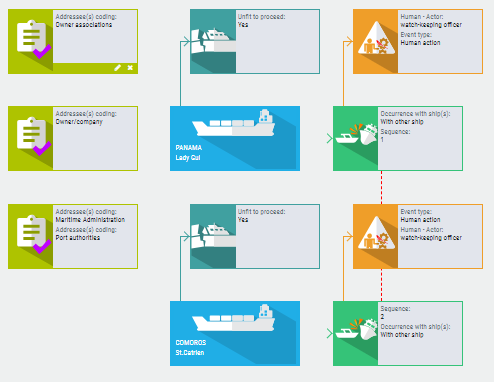Directive 2009/18/CE (article 17) considers submission of data to, and the general use of, EMCIP as an integral part of the overall safety investigation system. It requires that:
- Data on marine casualties and incidents shall be stored and analysed by means of a European electronic database to be set up by the Commission, which shall be known as the European Marine Casualty Information Platform (EMCIP);
- Member States shall notify the Commission of the entitled authorities that will have access to the database;
- The investigative bodies of the Member States shall notify the Commission about marine casualties and incidents in accordance with the format described in Annex II. They shall also provide the Commission with data resulting from safety investigations in accordance with the EMCIP database scheme;
- The Commission and the Member States shall develop the database scheme and a method for the notification of data within an appropriate timeframe.
Article 2(f) of Regulation (EC) No 1406/2002 requires EMSA to provide the Commission and the Member States with objective, reliable and comparable information and data on maritime safety and on pollution by ships, to enable them to take the necessary steps to improve maritime safety and prevention of pollution by ships, and to evaluate the effectiveness of existing measures.
Article 2(e) of the same Regulation requires EMSA to facilitate cooperation between the Member States and the Commission in the development, with due regard to the different legal systems in the Member States, of a common methodology for investigating maritime accidents according to agreed international principles, in the provision of the support of the Member States in activities concerning investigations related to serious maritime accidents, and in the carrying out of an analysis of existing accident investigation reports.
The EMCIP database's structure enables the storage and processing of data concerning casualty with ships and with persons at sea. Member States' National Competent Authorities act as data providers and data consumers.
The database taxonomy takes into account the conclusions of the European project 'Casualty Analysis Methodology for Maritime Operations' (CASMET), the categories of the 'Cognitive Reliability and Error Analysis Method' and the casualty analysis formats of the International Maritime Organization (IMO) on harmonised procedures for reporting marine casualties and incidents.
The platform embeds state-of-art investigation and reporting tools, like cooperative editing features, events and contributing factor analysis charts, mainstream taxonomy-based reporting interfaces and business intelligence tools.
EMCIP stores data relating to the particulars and consequences of all notified marine casualties, incidents, and occupational accidents. Additionally, on completion of a safety investigation, the Member States’ investigative bodies report data relating to the sequence of accidental events, the identification of contributing factors, including human factors and others relating to shipboard operations, shore management and regulatory influence, and any resulting safety recommendations.
EMSA and the national competent authorities operate the system within a culture of 'no blame, no liability' and personal data protection. They have direct access through internet to all EMCIP data that are not barred by special arrangement, and are able to produce statistics, safety studies and other reports for safety related purposes using pre-defined and open search tools.
EMCIP adds quantitative, qualitative, and economic value to the investigation of marine casualties and incidents by streamlining and consolidating the acquisition and storage of notification and investigation data received from all Member States using a common taxonomy. EMCIP thus enables effective analysis of that data, general risk identification and marine casualty and incident prevention at national and European level.

The European Casualty Information Platform - EMCIP owes its creation, as the European electronic database for the storage, exchange and analysis of data on marine casualties and incidents, to a series of rulemaking initiatives at the EU level, in particular, the Directive 2009/18/CE of 23 April 2009, establishing the fundamental principles governing the investigation of accidents in the maritime transport sector; this Directive amends Council Directive 1999/35/EC and Directive 2002/59/EC of the European Parliament and of the Council.
EMCIP provides the means to store data and information related to marine casualties with ships and with persons at sea. It also enables the production of statistics and analysis of the technical, human, environmental and organisational factors involved in marine accidents.
The database taxonomy has been developed by EMSA in consultation with the Member States, on the basis of European research and international recommended practice and procedures.
In accordance with Directive 2009/18/EC, from 17 June 2011 Member States are required to notify information on marine casualties that occurred on board ships flying their corresponding flag, or within their coastal waters, or for which they hold a substantial interest, in EMCIP. Furthermore, whenever any of these cases is investigated, the resulting data will be stored too.
EMSA assists Member States and the Commission with initial analysis of such data, the development of trend monitoring mechanisms, proposals for safety recommendations, the improvement of existing European legislation and promotion of new technical requirements.